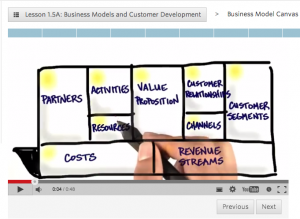
That the lean philosophy can be applied much more widely than manufacturing, if done so intelligently, should perhaps come as no surprise to readers of this blog. Recently, I’ve been learning more about one particular re-invention: the lean startup. The ideas have a clear heritage through lean and agile and, of course, place the customer very much in focus. I took the Udacity course How to Build a startup by Steve Blank to get a good overview. There’s plenty in the media on this topic too, with an Economist video special report on Startup 2.0, and even a poignant mention of what can go wrong with the traditional approach to startups on a Listserve email.
The big idea behind Lean Startup is that you need to talk to your potential customers, suppliers and partners and stakeholders as you develop your product ideas, so that you iterate your way to the market rather than failing after a massive investment. The entrepreneur (maybe that’s you?) uses rapid learning cycles to progress thinking, and when you discover some aspect of the plan (product, customer group, revenue model) isn’t viable you pivot to something better. Some key waypoints along this road are:
- Define your product or service in terms of the needs (physical and emotional jobs to be done) and problems of your potential customer
- Test the hypothesis by asking these people – not forgetting that different groups most likely have different needs
- Develop a minimum viable product that contains the essence of your idea (but no more) and test the hypothesis that people really will use it (and that you can make money from it)
After some thought of course, it becomes clear that the lean startup is none other than a lightly disguised version of design for six sigma, maybe a little less quantitative and a little more iterative, and good to see it getting wider exposure.
The lean startup is, I think, a very logical approach, particularly for web and mobile applications but also applicable to other products, particularly when developing a new market. Maybe the framework can be stretched even wider, to selling any kind of service or idea, all the way through to selling oneself when job-hunting. The key when applying this thinking to new areas, of course, is to begin with the philosophy and develop appropriate tools for the new area rather than mis-translating old ones.